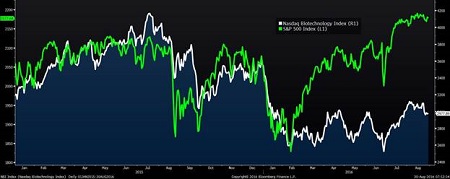Although all sectors of the market are sensitive to government policy, healthcare is particularly so. One of the bellwether healthcare indices that we watch is the NASDAQ Biotechnology Index. As the election season was getting underway in earnest earlier this year, it was an open question in our mind whether political noise about drug pricing would continue to put pressure on biotech. Since the candidates had both expressed concerns about drug pricing, perhaps they would focus on areas of greater disagreement and the industry would get less negative publicity. With several of our favorite biotech names approaching attractive price levels and with healthy growth still visible for them, we watched the political environment carefully. While the S&P 500 rallied from stumbles earlier in the year, biotech continued to perform anemically.
It is safe to say that the verdict is in: the political pressure is not coming off healthcare. In recent weeks, we’ve had a new dose of public outrage about drug pricing, this time focusing on the EpiPen injector manufactured by Mylan (NASDAQ:MYL) [NASDAQ: MYL]. General uncertainty has risen as Aetna (NYSE:AET) [NYSE: AET] has announced its withdrawal from 11 of the 15 Affordable Care Act (ACA) markets where it had operated -- with some analysts calling this withdrawal a “death knell” for the ACA in its current form. As we know, markets do not like uncertainty. With events underway that could require a significant reshaping of the U.S. healthcare system yet again, no matter which candidate wins, this is probably a cautionary signal for investors no matter how attractive valuations may begin to look.
Still, we advise readers to work on their shortlist of attractive companies -- based on events and fundamentals. We believe that although the long-term landscape will include greater pressure on pricing, the regulatory environment will not quickly become one in which the U.S. stops being the engine of global pharma and biotech discovery. Fear of price controls is here; actual price controls are far off. As the market begins to discount this reality, perhaps after the dust has settled from the election, many pharma and biotech stocks with good pipelines and strong management teams may present excellent buying opportunities.
We would like to draw readers’ attention to one area specifically: biosimilars. We’ve covered these drugs in the past -- generic versions of the complex new biologic drugs that have provided so many of the last decade’s transformative new therapies. (“Biologics” are large molecules, in contrast to small-molecule chemical drugs, and can be extremely challenging to discover and manufacture.) The regulatory landscape for these drugs is still being determined. Currently, biologics enjoy a 12-year period of exclusivity for their inventors; one key plank of Hillary Clinton’s healthcare platform is the reduction of this period to seven years, which would open opportunities for companies that have the technical know-how to produce biosimilars. A Clinton victory is therefore likely to be seen as a bane for many big biotechs, whose future revenues largely depend on the success of the new biologics in their pipelines. On the other hand, it could be a boon for such companies as Coherus Biosciences [NASDAQ: CHRS], Momenta Therapeutics [NASDAQ: MNTA], and AbbVie [NYSE: ABBV]. (CHRS and MNTA are a small biotechs specializing in biosimilars. ABBV is a large company with extensive experience in producing biologics which has invested heavily in developing biosimilars to challenge its rivals.)
Investment implications: Healthcare isn’t catching a break. Campaign rhetoric and negative newsflow continue to put pressure on the sector, as the prospect of further shake-ups looms and presidential candidates rattle their sabers about drug pricing. Some healthcare stocks, particularly biotechs, have begun to approach attractive valuations, but we believe it’s not time to pull the trigger yet. Investors should work on their buy list for the time when the market shrugs off its political anxieties and recognizes that price control fears have been premature. We think investors should look particularly at the biosimilar space as the regulatory environment around it takes shape, as well as focusing on proven biotech innovators with good pipelines and seasoned management.

